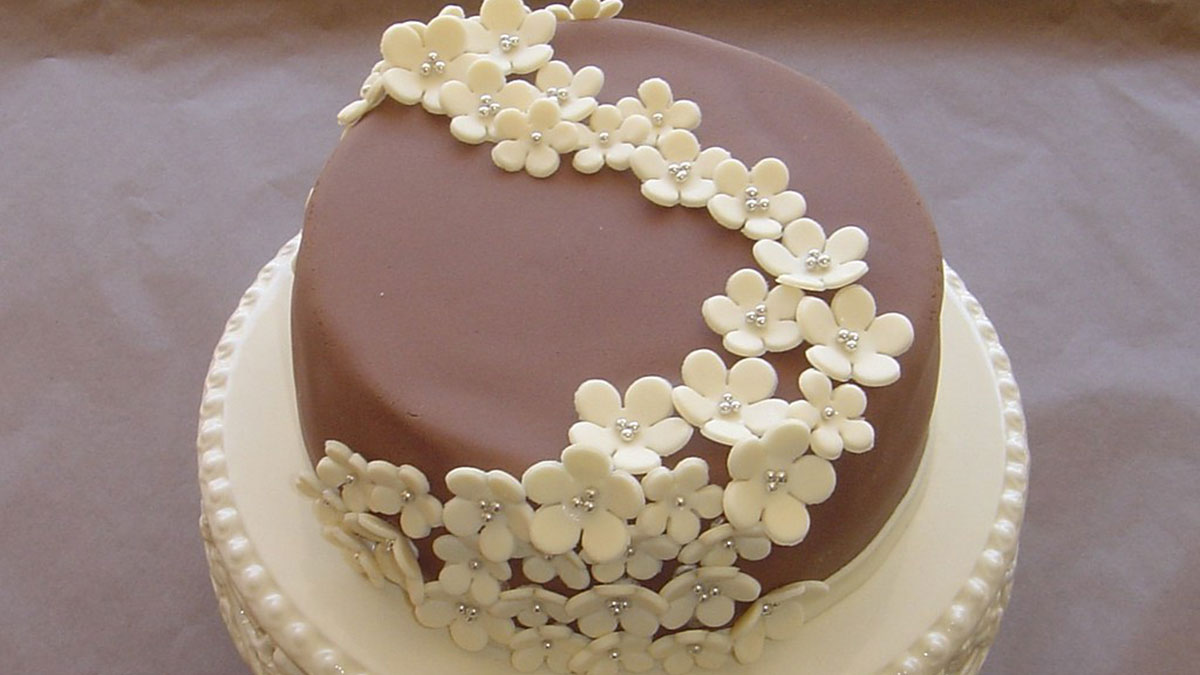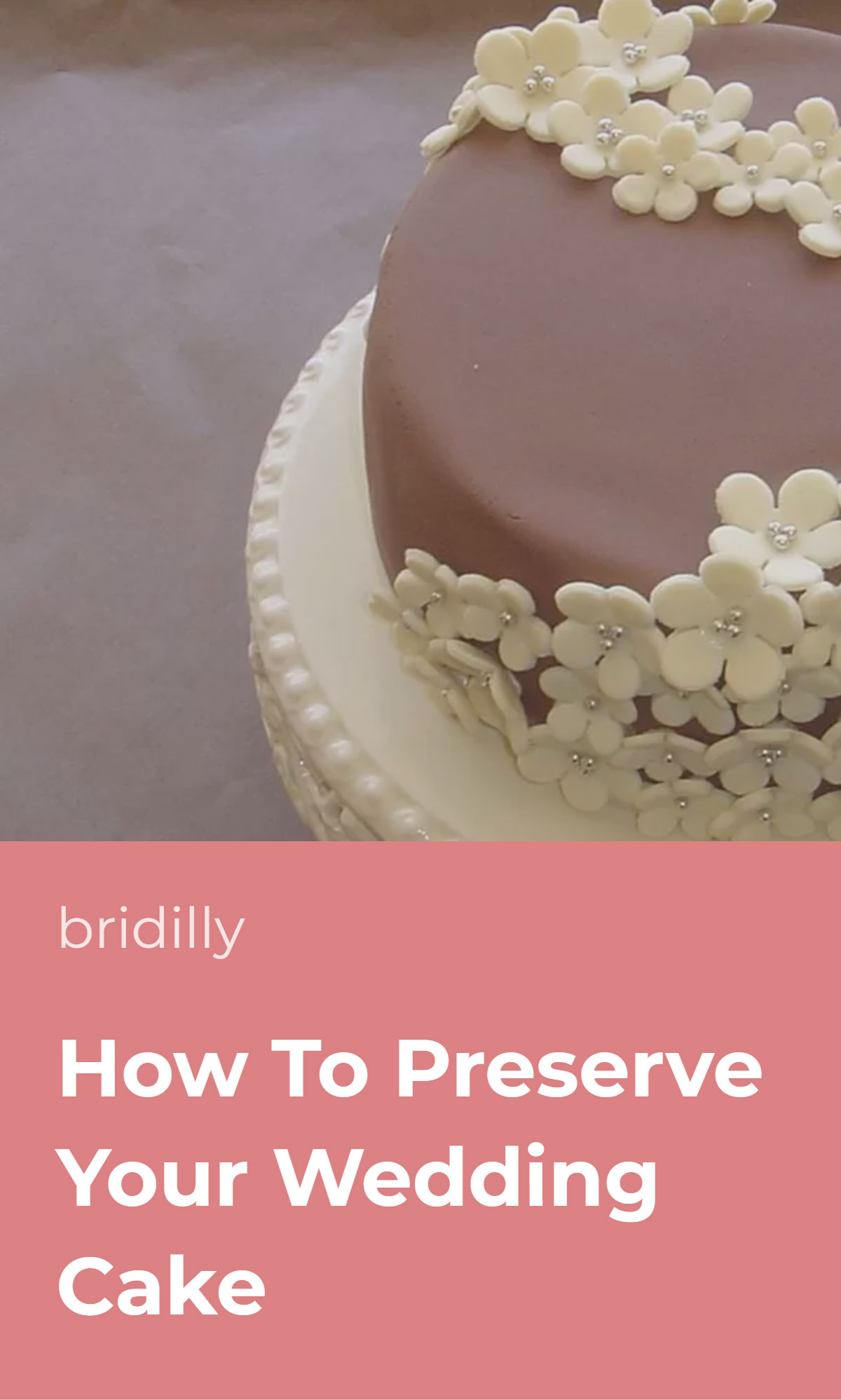Knowing how to preserve a wedding cake the right way is vital for anyone wishing to eat it a year later.
An incorrect preservation technique may compromise the cake’s taste and, what’s worse, increase the risk of spoilage.
The tradition of eating wedding cake for the first anniversary is a meaningful way to celebrate your love, but you can’t simply tuck it in the freezer and forget about it.
You probably want your cake to taste the same as on your big day. While that’s unlikely, it isn’t impossible if you follow the rules and freeze your cake right after the wedding.
However, many modern couples refrain from this wedding cake superstition and order a mini version of their cake for the anniversary to enjoy the taste again without the hassle of freezing it.
Table of Contents [show]
Can Any Cake Be Preserved?
You may wonder – can any wedding cake be preserved? In short, yes – you can freeze any cake, regardless of its flavor, size, and other factors. However, certain cakes last longer than others.
In general, oil-based wedding cakes store better than other cake types. Fluffy, airy cakes dry out the fastest. If you have no idea what’s your cake base, don’t hesitate to ask your baker.
You may also tell your baker about your preservation plans and consult about the best suitable flavor. Every recipe is a bit different, and only the baker will be able to advise you.
Note that there’s no guarantee that your wedding cake will last for a year in perfect condition even if you do everything right.
The odds of discovering that your cake tastes awful and is impossible to eat when defrosted are pretty high. But even if your cake tastes like old bread, it should still be safe to eat if you follow the rules.
Realistically, though, the entire purpose of eating cakes is to enjoy the taste. Most bakers don’t recommend storing a cake in the freezer for over six months.
If you’re concerned about eating a cake that’s a year old, consider ordering your wedding cake copy for the first anniversary. It will be equally beautiful and taste even better. Perhaps, the only drawback of this option is added costs.
Alternatively, eat the cake for your six-month anniversary, first newlywed date, or another significant occasion.
Prepare Ahead
As a rule of thumb, the sooner you freeze the cake, the better. Unfortunately, freezing the cake right after the wedding isn’t always possible.
Your wedding may be held out of town, or you may want to sleep after a long night of partying. Regardless of the reason, you likely won’t be able to take care of the cake on the day after the wedding.
Most wedding cakes only last for a couple of days without freezing, a week at most. If you freeze your cake too late, it won’t last for a year, so act as quickly as possible.
Instruct your catering staff, maid of honor, or another responsible person to take off the top tier of your cake at the end of the reception, put it in a dedicated box, and transport it to a safe place.
Avoid cutting the top tier at your reception because icing protects the cake’s filling. Instead, only cut the bottom tier.
Remove Ornaments & Decorations
Before you move on to wrapping your wedding cake, remove any decorations and ornaments. That’s especially relevant for fresh flowers and other decorations that can go bad quickly.
One may think that removing sugar flowers and chocolate is unnecessary because they have a long lifespan. However, decorations will prevent you from wrapping the cake properly.
You want to wrap the cake tightly, ensuring no air gets under the plastic wrap. The only way to achieve that is by removing all decorations because a perfectly smooth cake allows for better coverage.
Furthermore, you may squish the decorations if you wrap the cake as is, and they won’t look as appealing after a year anyway.
If you’d like to preserve sugar flowers or chocolate figurines from your wedding cake for your first anniversary, remove them and wrap them separately. You can then put them back on the cake when you defrost it.
Allow The Frosting to Harden
Don’t get straight to wrapping after removing the decorations. Instead, let the cake sit in the fridge to harden a bit. Chilling the cake will preserve the structural integrity and maintain the icing look.
Allowing the cake to harden before wrapping it is especially important for buttercream cakes. Buttercream is extremely soft and starts melting in warm temperatures.
On the other hand, fondant cakes may not require chilling because the icing is hard, and smudging it isn’t that easy.
There’s no need to freeze the cake. Simply put it in a fridge for about 20-90 minutes, depending on the cake’s condition and icing.
Wrap It & Freeze It
Now, it’s time for the most important step in wedding cake preservation. Wrap the cake before freezing it to ensure it isn’t exposed to air. If any air gets under the wrap, the cake may spoil.
Begin with plastic wrap you’d normally use for wrapping leftover foods or sandwiches for a picnic. One layer of plastic wrap may not be sufficient, so apply at least two layers, pressing them onto the cake’s surface.
Don’t press too hard, though. Even if you’ve chilled the cake beforehand, it won’t be stone-hard, and you risk damaging it.
After covering the cake with plastic wrap, follow up with two-three layers of aluminum foil to preserve the cake from the air, odd odors, and temperature changes in the case of short-term power outages.
Never use aluminum foil for the first layer because it causes freezer burn. The cake may appear shriveled, discolored, and tough.
Then, place your cake in a zip-lock bag, close it tightly, and put it in a container with an air-tight lid. You can’t do too much to protect your cake, so don’t be afraid to layer it up.
Prevent Odd Smells
The wedding cake likely won’t be the only food in your freezer. The problem is that the cake can easily absorb the smells of other foods, such as fish, meat, or frozen onions.
You likely don’t want to eat a cake with onion or meat flavor, so take measures to prevent it. If possible, keep the cake in a separate freezer compartment.
If your freezer is small and you can’t separate the cake, place it in a plastic container with a lid. Keep other foods properly wrapped and in containers to minimize the odor transfer.
You may also place a box of baking soda in the freezer. It effectively absorbs odors and will help to maintain your wedding cake’s original smell.
Consider Your Post-Wedding Plans
One vital wedding cake preservations rules is not to defrost and refreeze the cake. Firstly, it increases the risk of spoilage. Secondly, even if the cake doesn’t spoil, defrosting and refreezing may negatively affect its flavor.
Many couples move to a new house during their first year of marriage. If you plan to move, consider leaving the cake at your parents’ house where it will be safe.
However, don’t panic in the event of a power outage or if your parents unexpectedly need to relocate. The cake can be defrosted for a short period, although it isn’t recommended.
How To Defrost The Cake
You should know how to defrost a wedding cake in advance because you can’t simply take the cake out of the freezer on your anniversary day. Proper wedding cake defrosting takes time.
First, take the cake out of the freezer and remove it from the plastic container and zip-lock bag. Put it back in the container and place it in the fridge to thaw.
Keep the cake away from fish, meat, and other smelly foods because it will absorb odors even more than in the freezer. You may keep it in the fridge overnight, about 6-12 hours.
Then, take the cake out and leave it on the countertop for another couple of hours. Enjoy at room temperature.
History Of Wedding Cake Preservation
The tradition of preserving wedding cake is a long-standing one. The custom originated in 19th century Britain where wedding cakes were typically made from dried fruit, like Christmas puddings.
Historically, the bottom layer was eaten during the wedding, the middle layer was sent off as a gift, and the top layer was preserved.
Fruit cakes are excellent for preservation because there aren’t many ingredients that can go bad. Couples used to eat their wedding cake for their child’s christening or their first anniversary.
It was typical to have a child right after the wedding in the old days, often before the first anniversary.
Historians don’t know for sure the reason behind the tradition of eating the top layer of a wedding cake. Some suggest that it was a way to save money on ordering a new cake.
Others argue that the custom was solely sentimental and symbolic. At that time, people believed that couples were to be lucky on their wedding day. Eating the wedding cake later allegedly brought luck and prosperity to the couple’s home.















No Comments Add one
Leave a Comment